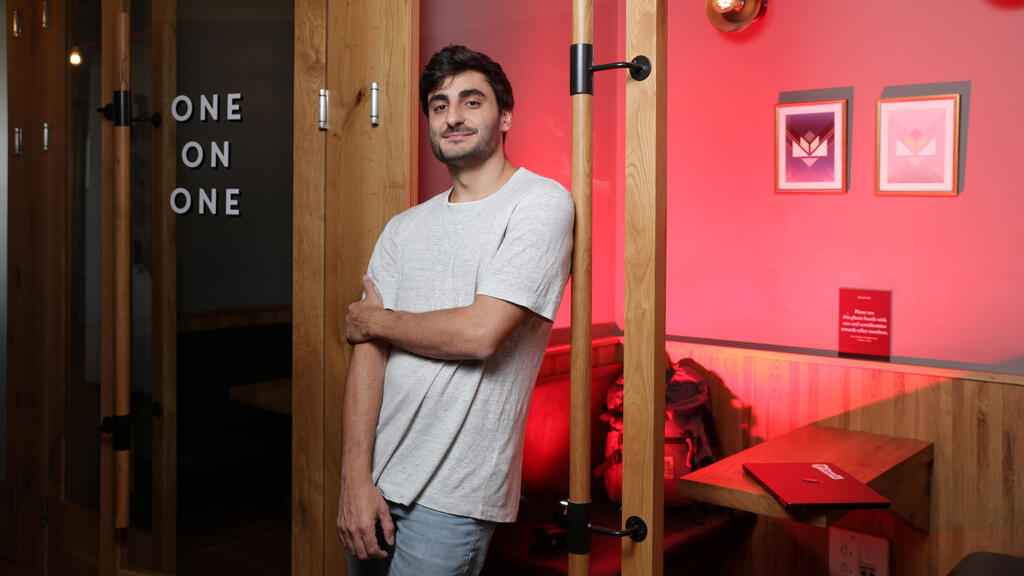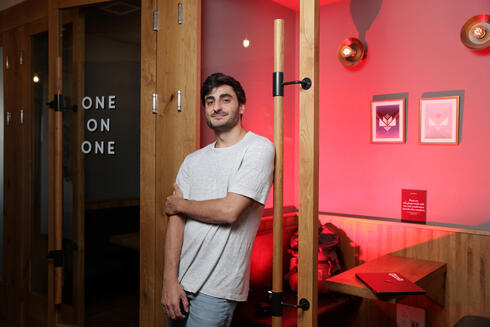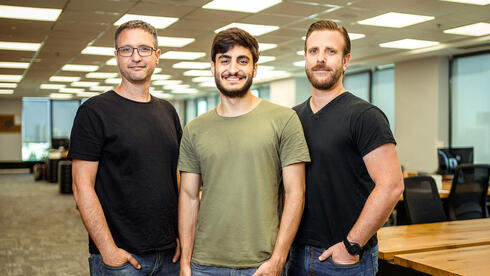
"I achieved the Holy Grail: I built software that builds software"
At 31, with no investors and almost no staff, Maor Shlomo sold his one-man startup Base44 to Wix for $80 million in just six months, a story that captures both the promise and peril of the AI era.
At just 31, seemingly out of nowhere, Maor Shlomo became the poster boy for the modern high-tech exit dream. An entrepreneur who founded a one-man company, with no investors, no organization, and no marketing or sales department, managed within just six months to sell it to website-building giant Wix for $80 million.
But more than that, Shlomo has become both the exciting and unsettling face of the enormous disruption artificial intelligence is bringing to the tech world, especially in software. The startup he founded and sold at record speed was built with AI, later upgraded with AI, and ultimately offers the possibility for anyone to build applications using AI, with almost no human involvement.
Base44 is a tool that allows anyone to build an app without programming knowledge. Instead of writing complex lines of code, users simply describe in words what they want the app to do and how it should be used. AI translates those requirements into a ready-to-use product, whether a stock-tracking website, a task-management system, or even a complex online game.
“From a megalomaniac perspective, this is the Holy Grail of the software world,” says Shlomo. “There’s nothing cooler for an entrepreneur than building software that builds software. That’s how I founded Base44: artificial intelligence helped me write much of the code and content. In the age of AI, one person is no longer just one person, AI multiplies your productivity ten-fold.”
“I’m still on a high,” he adds. “But I didn’t have that morning where you wake up and say, ‘I made it.’ The day we signed the agreement to sell to Wix, the war with Iran broke out. The excitement was mixed with missile alerts and fear of what might happen. It took me a few days to digest.”
Your story represents a new world where people leap straight from seed to exit, or was this just a one-off coincidence?
“I didn’t even do a seed,” he smiles. “And we’re definitely going to see a new generation of companies with just one person, or very few, that won’t need funding. There will even be one-person unicorns.”
How will that happen?
“It’s because moving fast no longer requires more people or more money. You don’t need a fleet of coders, AI writes the code. You don’t need a huge support team, AI fixes bugs on its own. The only thing you still need is to pay for ads.”
So why did you hire employees at all?
“On the day of the sale, we had six employees: two in support and the rest programmers. But all but one had joined me just 30 days earlier. I hired them once I realized the company was going to be sold and knew we’d have to scale quickly.”
Base44 indeed grew at record speed. On the eve of the sale, the tool had already reached 350,000 users and revenues of about $200,000 per month, without raising a single shekel. In fact, during those few months of operation, Shlomo turned down several prominent funds and investors who wanted to invest.
“We’ve been growing at a dizzying pace since the sale,” he says. “I’m sure we’re one of the fastest-growing companies in Israel ever, though it will take time to see that.”
Why join Wix instead of remaining a one-man company?
“Because in this market, everything moves incredibly fast, and you’re competing against companies that are scaling quickly and raising large amounts of money. I wanted to make Base a global sensation. To do that, the right move was to join Wix, build a strong team, and bring in top talent.”
Ability to Recruit Investors
“Almost every fund operating here approached me, but I wanted to continue bootstrapping” (running the company on the entrepreneur’s own money or profits), Shlomo explains. “It stresses me out when other people’s money is in my company. It really makes me anxious. We’re used to thinking the default in the startup world is raising money, but my company was already profitable, so there was no reason to take on that extra pressure.”
One of the offers you rejected was from Oren Zeev, one of the most prominent investors in Israel, who also invested in your previous company, Explorium. Didn’t that offend him?
“Oren and I are very good friends. I really appreciate him. The refusal wasn’t personal, it was about the investment.”
You could have raised a small round at least, just as a safety net for bad days.
“If bad days had come while holding other people’s money, I would have been even more stressed. In my opinion, one of the best qualities of an entrepreneur is not being overly sensitive or fearful about money. And I’m not like that. I’ve learned that I function best when I can go to sleep and wake up with peace of mind. That keeps me focused. I spend less energy worrying about what might happen and more on actually building a good product.”
A Story that Begins with Reserve Duty — and Ends on a Thai Island
The story of Base44 begins on October 7, 2023. On the day of the Hamas attack, Shlomo was drafted into the reserves with Unit 8200, where he served for a year. “It was a crazy year. The work was incredibly meaningful, you felt that if you cracked the code on something, you were saving lives and defeating the bad guys. And all the superstars of high-tech poured into that mission. We brought the best people to work together, and the teams I was responsible for were amazing.”
How did Explorium, the veteran company you were running at the time, manage without a CEO for so long?
“It was a necessity. I didn’t know I’d be in the reserves for a whole year, and at some point, Omer Har, our CTO, had to step up. About six months into my reserve duty, the company learned to operate without me. That gave me a chance to take a breather and rethink my life. After all, I founded Explorium when I was just 23. I was so inexperienced I’d interview people and then ask them how I was doing. It was a different time, for me and for the industry.”
What made you want a change?
“I wanted to get back to touching the product. I was lucky to serve as a CEO for seven years, but at my core, I’m a product person. Being CEO pulled me away from what I love most, sitting with teams and writing code. So I left the reserves a bit confused, but I knew one thing: I wanted to build a product.”
After leaving the reserves and stepping down from Explorium (remaining a shareholder and board member), Shlomo and his partner, Yuval Dahan, set off for two months in Thailand and the Philippines. “Yuval and I wanted to experience a bit of digital nomadism,” he says. “For me, it was mainly to cool off after an intense year of service. Koh Pha Ngan is a fun place to sit and work.”
And that’s where the idea began. “Yuval is a tattoo artist and needed a website and customer management system for her business. I tried to build it for her in WordPress, as people recommended, but I kept racking my brain, I was the CEO of a tech company, and yet it was so difficult. That didn’t make sense to me.”
And how did that frustration turn into a new venture?
“When I sat with Yuval about the website, I tried building tools for her that would bring in more users and let her do AI-powered tattoo sketch simulations with clients. That’s when I realized AI could write the code for the website she needed, it just didn’t have the right environment to do it. The existing software-building tools weren’t adapted to today’s world. So I started experimenting with AI tools, building all kinds of things, until I became obsessed with the idea.”
What was the idea?
“To remove the programming and cost barriers for small business owners, and let them set up websites or apps on their own without writing a single line of code.”
But they still need to know how to write prompts, right?
“Of course, the more details you give the AI, the better it understands. But the world has changed: you no longer need to run endless validation and market research before testing an idea. You can type something vague, and within 10 minutes you’ve got an app. If it’s not what you wanted, throw it away and redo it. The whole way we interact with software has been transformed.”
How do you develop such a complex product on your own?
“Not really on my own. I shared every step of the process on LinkedIn, how I was building the product, the challenges, the wins. That created an incredible community around it, the strongest I’ve ever seen. They voluntarily helped at every level, giving constant feedback. Users would test the system and say, ‘This part is broken,’ or ‘Here’s what competitors did differently.’”
You basically recruited an unpaid army.
“It was wild. People really wanted me to succeed. Someone at MIT wrote me that he was spreading the word there. In April, I organized a hackathon to build apps for social good, and the community stormed in to provide support. When I launched on Product Hunt, I asked people to jump in and comment, the traffic was so huge they thought it was a bot attack. Today there are WhatsApp groups with thousands of users buzzing with real-time feedback.”
What makes strangers rally behind an entrepreneur they don’t even know?
“Many of my users were building their own businesses on Base44, so they felt part of the success. My radical transparency helped, I shared struggles and mistakes freely, which you can do when you’re bootstrapping. Entrepreneurs who raise capital can’t do that; they need to show that they are an attractive investment. But when everything you achieve is on your own, it feels like playing the game on hard mode. When I sold to Wix, people told me they felt as excited as if they had made the exit.”
Who were your first customers?
“In the early days, I’d bring in 20 community users every two weeks to build things together. A jeweler, a psychologist, a coach, a lawyer, even a doctor from Ichilov who wanted a tool to help medical students find articles. When a friend asked what it could do, I told her: ‘Anything! Even a Tinder for dogs.’ So I uploaded pictures of our dogs and showed her how it worked.”
Do you remember your first paying client?
“Of course. I’ll never forget it. One morning, in my pajamas, I logged in and saw someone had just paid me $100. I was shocked. I was used to the old-school process, endless calls, contracts, POCs, chasing clients. Suddenly, someone I’d never met just bought. I literally danced with joy. I realized B2C is so much fun, and from there, the only direction was up. The product would only get better, and more people would hear about it.”
Now that you’re part of Wix, don’t you miss the magic of being a one-man bootstrapper?
“You know the parable of the goat, you take the goat out of the crowded house, and suddenly you have space? That’s how I feel. After months of being frugal, saving every dollar for ads, suddenly I have a world-class marketing team with real budgets. It’s a relief.”
Still, isn’t it hard for an independent entrepreneur to suddenly become part of a corporation?
“I don’t feel corporate, maybe because we’re a separate product within Wix, or maybe because we’re well supported. Of course, in big companies you have legal and other departments that slow things down, but we’re not feeling that yet. Quite the opposite: I constantly think about which areas we must keep startup-like and fast, and where we can leverage Wix’s empire, in marketing, support, financing, operations, and now building a sales team. I try to do it all at once.”
Is the small startup making the giant that acquired it redundant?
The other side of Base44’s rise is the plunge in Wix’s stock. Wix, which offers an intuitive platform for building websites, has experienced firsthand the disruption brought by the new AI world. While $80 million is a small sum for a $7 billion company, Wix badly needs what Base44 provides: expansion into an adjacent field with minimal manpower.
Wix is still reporting strong business results, publishing optimistic forecasts, and its annual revenue is expected to reach $2 billion. But at the same time, it was recently included in the dubious list of 26 companies that Bank of America estimates could be harmed by the AI revolution. Investors are worried, and in the past six months, Wix has lost about 40% of its value.
Over the past year, Wix has undergone streamlining and layoffs as part of a strategy to prioritize profitability over growth, while also searching for new growth engines to help it enter the AI era. In a conversation with investors, Avishai Abrahami, Wix’s co-founder and CEO, estimated that the acquisition of Base44 could add $50 million to its annual revenue.
Indeed, Base44 will increase Wix’s revenue, but it also poses a threat to Wix’s long-standing business model: for 20 years, Wix has relied on thousands of employees, programmers, designers, and marketers, to build and sell website tools. Base44, on the other hand, developed a simple, zero-investment tool that lets consumers describe the application or software they want and receive it instantly.
“Wix and Base play on two different fields,” Shlomo insists. “Wix has an amazing new product for websites, not for apps. With it, you can also whisper a few words to AI and it will create a working website. Base, however, expands Wix’s market into app-building. Things may overlap in the future, but they’re not the same.”
It’s strange to say, but in the new AI world, you could be the big story, and Wix the small one.
“Wix would have undergone serious transformations with or without me. Their product was bound to evolve significantly, and the fact is, Base grew tremendously within it.”
Did you hesitate before going with Wix?
“The hesitation was whether to sell at all. Anyone who knows both companies understands that this is the best fit, we share the same target audience. So unlike other approaches from investors or companies, when Wix contacted me, I said, ‘Of course I’ll go,’ even though selling wasn’t on my mind. I spoke with Nir Zohar (Wix’s president) and Avishai Abrahami (CEO) about our view of the market, and about potential partnerships or investments. Then Nir said, ‘I think you need a steak night at Avishai’s.’”
Related articles:
Is that how they win over hesitant entrepreneurs?
“Apparently,” he smiles. “When we were sitting down for steak and wine, we said, ‘How fun would it be to work together?’ I realized that in the end, Wix and I share the same DNA, for better or worse.”
How exactly? They’re an aircraft carrier, and you’re a speedboat.
“It’s a company of thousands, but in the end I sat down with Avishai to talk about customer interface, and we both just love building products. When Yuval and I came back from the Far East, I said to her: ‘If I can make a living from this, that would be amazing.’ I wasn’t looking to raise massive funding, I just wanted to build a product that was fun to create. But then Base became very successful, and good chemistry developed between me and Avishai. After a few conversations in the advertising world, Avishai told me: ‘I won’t convince you to sell if you don’t believe in it.’”
A good strategy on his part, not to show too much enthusiasm.
“We analyzed the options: stay bootstrapped, take on investors, or join Wix. I told Avishai, ‘I see Base becoming successful, impacting people’s lives, and turning into a global product.’ He answered: ‘Then your story, of one person, bootstrapped, without investors, needs to end. If you want to be global, the market moves fast. You’ll need marketing, sales, and support. If that’s really your goal, you need either investors or us.’”
And then he made an offer?
“Not yet. First, I met the team to see if the chemistry was right. Then the negotiations began over how to structure the deal. In the end, it’s a life-changing deal, since 100% of the shares were mine. We agreed on a very strong model that gives me real incentive \[the payout increases if the company meets revenue targets by 2029\]. That way, I can wake up each morning and still feel it’s mine, and that it’s still fun.”
In the end, won’t it look like you sold too cheaply?
“I really hope so. I’m fighting hard to prove it. But that’s the beauty of the model we set, if that happens, I won’t feel like a sucker.”
A history of last-minute U-turns
Shlomo grew up in Haifa, the son of high-tech parents: his father Shmuel is a business development manager at Elbit (“the hardest-working man I know”), and his mother Orit worked on the development of X-ray and MRI systems at Philips. He is the youngest of five siblings, with a 19-year age gap between him and his eldest brother.
“I was a child with very severe attention deficit hyperactivity disorder,” he says. “When something fascinates me, I can concentrate extremely hard, but then I forget everything else. Even during the founding period of Base, I would sit 17 hours a day working and forget to eat. Now I’m supposed to get married and need to get an ID card, and it’s hard for me just to think about making an appointment and dealing with the bureaucracy.”
As a teenager, Shlomo excelled in math and computers, so it was no surprise when he was accepted into the IDF’s prestigious Talpiot program. But just before enlistment, he asked to change assignments:
“I was stressed. I said, ‘Sorry, but there’s no way I’ll be able to sit in front of a computer for nine years doing math and physics.’”
He was transferred to elite tracks in Military Intelligence and eventually reached Unit 8200, where he had to learn to analyze and cross-reference huge amounts of information. To cope, he taught himself programming and built a tool that automated the work.
“The tool I built for my team became a central information analysis system for 12,000 users a month in Military Intelligence,” he says proudly. “For the first time, I experienced the satisfaction of creating a product that solved a problem for a community. When I left the army, I said: ‘This is what I want to do for the rest of my life.’”
The next obvious step was computer science at the Technion, and Shlomo was accepted into its elite program. But once again, he made a last-minute U-turn.
“I realized I wouldn’t be able to do it, because I can’t just sit on my ass,” he explains. “Instead, I told myself I’d start building some kind of product, and we’ll see later about my studies.”
So in 2017, Shlomo co-founded his first startup, Explorium, together with Or Tamir and Omer Har. Like the tool he built in the army, Explorium provided predictive capabilities using big data, connecting company data to thousands of external databases to create a kind of search engine for information about businesses, websites, locations, behaviors, and timelines.
As CEO for seven years, Shlomo faced all the challenges of a traditional startup: raising $50 million across several rounds, chasing large customers, and dealing with investor pressure to scale. Then the war came and disrupted all his plans.
Is Explorium profitable today?
“I’ll leave that to the company’s executives to answer. As a rule, VC-funded startups usually become profitable only after their IPO, because until then there’s no incentive to. If you’ve already raised money, the mindset is to push the gas pedal as hard as possible to grow.”
You taught yourself programming to start a venture, but now at Base44 you’re eliminating the need for programming altogether. My daughter wants to study programming after her army service in four years. Should she?
“I’ll be careful and say that in four or five years it may no longer be worthwhile, because we’ll reach a point where there’s no reason to learn programming. When I learned programming, I studied ‘high-level’ languages. I didn’t learn machine code directly, like assembly was once taught, because by then more readable languages already existed. The same shift will happen again, the new programming language will simply be English or Hebrew. It’s still good to understand how computers work, but I don’t see people writing code in five years. You’ll have a junior developer called AI at your fingertips, and that will change the industry completely.”
Aren’t you worried this is a bubble? One programmer is still more reliable than an AI system that can spit out baseless answers.
“There’s definitely hype and reckless claims in the field. But AI is a game-changing revolution, and in my view it will be bigger than the Internet revolution. How many people already talk to ChatGPT daily? The impact and value are already enormous.”
Exit, war, proposal, and hospitals — all in one month
Last June was the most turbulent month of Shlomo’s life, and not just because of the exit.
“During that whole month, with the deal and the war with Iran, I was also at Rambam Hospital a lot with my mother,” he says. “She has lung cancer, and that month they told us the chemo wasn’t working well. I was really stressed and had to look for alternative treatments. She’s definitely improving now, and we’re all dealing with it. I think she’ll get through it.”
Tough.
“Yes, but in between I also managed to fly with Yuval to New York and proposed to her there. In the end I told her: ‘Enough, I need a little boredom after this year.’”
How do you close an exit while spending so much time at Rambam with your mother?
“My mother is my best friend. I knew the exit would make her very happy, she loves to be proud. She’s my cheerleader. To start a company, especially alone, you need to live under the illusion that you’ll succeed, even when your competitors have raised $100 million. In my case, that illusion existed thanks to her. She built in me a sense of infinite competence. Since childhood she told me I was incredibly talented. Entrepreneurship is just a continuation of a life path where your mother constantly believes in you and pushes you.”
Thanks to her, you lived inside a good dream.
“In 2022, when everyone was laying off 5%–10% of their workforce, we at Explorium also had to. I took it really hard. Then came the reserve duty period, after which I was so exhausted I didn’t know if I could start another company. Mom was there for me. She said: ‘Listen, you’re special. I believe in you. But this time, make sure you have fun too.’ And really, the whole experience of starting Base was just fun, largely thanks to her advice.”
It’s easier to have fun when you’re a one-person company, with no investors to please and no army of employees to manage.
“I had fun at Explorium too, but I also carried a lot of anxiety. I took everything very much to heart. When you do it the second time, it already feels like a profession. Today, my skin is thicker.”
Now you’re still euphoric from the deal with Wix, but there will be harder days. You’re in a competitive field, especially against Swedish startup Lovable, the fastest-growing software company in history, already generating over $100 million annually.
“There will definitely be harder days. A good market means fierce competition. And we haven’t even seen the giants step in yet, when Microsoft and Google enter the field, we’ll need to fight. But after seven years at Explorium, I learned that every period passes, good or bad. Right now you’re on a high because you closed a deal. At some point, there will be a bad quarter, and that too will pass. The key is to keep the overall trend moving in the right direction, and to keep doing things every day that give you the energy and patience to go on.”




